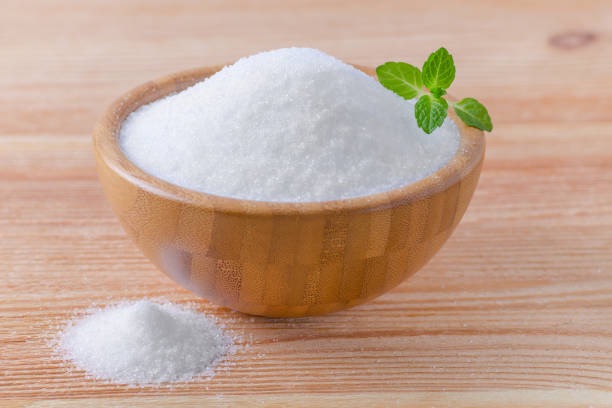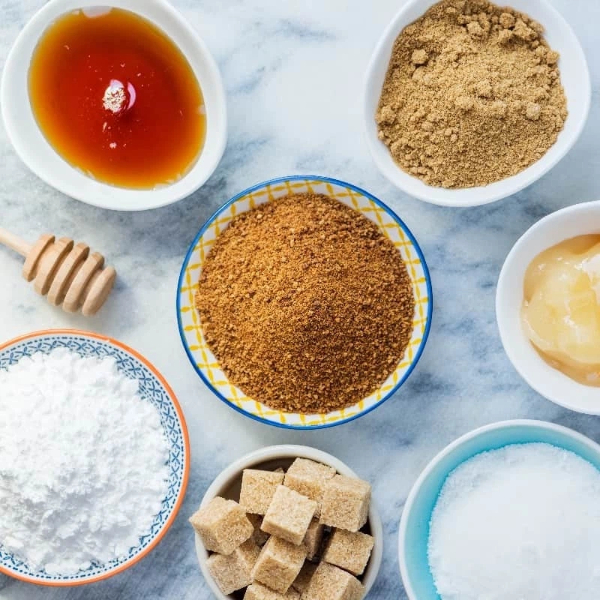Views: 222 Author: Sara Publish Time: 2025-08-09 Origin: Site








Content Menu
● Understanding Sweeteners and Their Role in Blood Sugar Regulation
>> How Do Sweeteners Affect Blood Sugar?
>> Metabolic Mechanisms Behind Sweeteners' Effects
>> Individual Variability in Response to Sweeteners
● Exploring Different Types of Sweeteners and Their Effects in Detail
>> Sugars
>> Natural Non-Caloric Sweeteners
● Emerging Research and Long-Term Considerations
● Industry and Consumer Implications
● Frequently Asked Questions (FAQ)
>> 1. Do all artificial sweeteners have zero calories and no effect on blood sugar?
>> 2. Can sugar alcohols be safely consumed by people with diabetes?
>> 3. Are natural sweeteners like stevia effective for controlling blood sugar?
>> 4. Could artificial sweeteners worsen insulin resistance?
>> 5. Should people with diabetes avoid sweeteners altogether?
Sweeteners have become an essential component in modern diets, offering an alternative to traditional sugar while addressing concerns about blood sugar management. From natural sugars to advanced artificial compounds, sweeteners vary widely in their effects on the body's glucose levels. For many people, especially those with diabetes, metabolic syndrome, or those pursuing weight control, understanding how sweeteners influence blood sugar is critical.
This article provides an in-depth exploration of sweeteners — their types, metabolic impacts, physiological effects, and potential health implications — with the goal of illuminating how sweeteners fit into health-conscious diets and product development for food, beverage, and healthcare applications.

Sweeteners are substances that impart a sweet taste to food and beverages. They can be classified broadly as follows:
- Sugars: These include natural simple carbohydrates such as glucose, fructose, and sucrose. Upon digestion, these sugars are rapidly absorbed and converted into glucose, leading to a quick rise in blood sugar levels.
- Sugar Alcohols (Polyols): Structurally similar to sugars, sugar alcohols include compounds like erythritol, xylitol, sorbitol, and maltitol. They generally provide fewer calories per gram and are digested more slowly, often leading to a moderated blood glucose response compared to regular sugar.
- Artificial Sweeteners: These synthetic or semi-synthetic compounds produce intense sweetness with little to no caloric contribution. Common artificial sweeteners include aspartame, sucralose, saccharin, and acesulfame potassium.
- Natural Non-Caloric Sweeteners: Extracted from plants, examples include stevia and monk fruit extracts. These do not contain calories and do not raise blood sugar.
The primary question is: do sweeteners raise blood glucose? The answer depends on the sweetener category.
- Natural Sugars cause rapid and substantial increases in blood sugar because they provide glucose or are metabolized directly into glucose.
- Sugar Alcohols vary in their impact. For example, erythritol is mostly excreted unchanged, causing almost no rise in blood glucose or insulin, while maltitol and sorbitol have moderate glycemic effects.
- Artificial Sweeteners are not metabolized into glucose and usually do not cause blood sugar increases. Clinical evidence generally shows that sweeteners like aspartame and sucralose have negligible effects on glycemia.
- Natural Non-Caloric Sweeteners such as stevia also show no significant impact on blood sugar levels, making them suitable substitutes for sugar without raising glucose.
Thus, while sugars raise blood sugar levels sharply, many sweeteners provide sweetness without the corresponding glucose spike.
Sweeteners exert their influence on blood sugar through different mechanisms. Sugars directly increase blood glucose because they are metabolized into glucose molecules. Conversely, many artificial sweeteners pass through the digestive system largely unmetabolized or are broken down into non-glucose components.
However, recent studies suggest that the relationship between sweeteners and blood sugar is more complex. Artificial sweeteners may:
- Modify the gut microbiota, potentially influencing glucose metabolism and insulin sensitivity.
- Affect intestinal glucose absorption and hormonal secretions related to blood sugar regulation such as incretin hormones.
- Interact with sweet taste receptors not only in the mouth but also within the gut and pancreas, potentially impacting insulin release and appetite regulation.
While these pathways are still under investigation, the findings underscore that sweeteners' influence on blood sugar and metabolism can be indirect and multifaceted.
The effect of sweeteners on blood sugar can differ significantly from person to person due to:
- Gut Microbiome Differences: Individual gut bacteria communities can modulate metabolic reactions to sweeteners.
- Genetic and Epigenetic Factors: Variations in genes related to carbohydrate metabolism and insulin signaling affect responses.
- Health Status: Those with pre-existing conditions such as type 2 diabetes or metabolic syndrome may experience altered responses compared to healthy individuals.
- Exposure Amount and Duration: Chronic consumption may have different effects than acute, one-time use.
Because of these variables, personalized dietary recommendations become important, especially in clinical settings.

Sugars, including glucose, fructose, and sucrose, are well-known for their rapid absorption and direct contribution to blood glucose. Excessive intake of sugars is strongly linked to poor glycemic control, insulin resistance, obesity, and type 2 diabetes development.
Sugar alcohols are often used as sugar substitutes because of their lower calorie content and moderated glycemic effects.
- Erythritol: Nearly zero calories, mostly excreted unchanged, minimal impact on blood sugar and insulin, generally well tolerated.
- Xylitol: Provides some calories, moderate rise in blood sugar, commonly found in sugar-free gums and dental products.
- Maltitol: Holds more calories and a higher glycemic index than erythritol or xylitol, causing a moderate increase in blood sugar.
People using sugar alcohols should consider dosage since excessive intake can result in gastrointestinal discomfort like bloating or laxative effects.
Artificial sweeteners deliver sweetness without calories and have no significant impact on blood glucose:
- Aspartame: Metabolized into amino acids, not glucose, minimal effect on glycemia.
- Sucralose: Mostly passes through the digestive system without being broken down, does not raise blood sugar.
- Saccharin and Acesulfame Potassium: Not metabolized for energy, do not contribute to blood glucose levels.
Despite their benefits, concerns remain about long-term metabolic effects linked to gut flora alterations and insulin sensitivity.
Natural extracts such as stevia and monk fruit are gaining popularity due to their perceived natural purity and demonstrated safety:
- Do not contribute to calories or blood glucose elevation.
- Some studies indicate additional antioxidant and anti-inflammatory properties.
They are considered excellent alternatives for individuals seeking "clean label" products or those managing blood sugar levels closely.
While sweets with high sugar content unquestionably raise blood glucose, research on the long-term metabolic effects of artificial and non-caloric sweeteners is ongoing.
- Some studies reveal that artificial sweeteners may alter gut microbiota composition, potentially leading to impaired glucose tolerance and insulin sensitivity.
- There is no firm consensus whether these microbiota changes translate into clinically relevant insulin resistance.
- Long-term observational and intervention studies are needed to clarify whether chronic sweetener consumption affects metabolic health negatively.
- A balanced approach emphasizing moderation and variety in dietary sweeteners is recommended.
Personalized nutrition that takes into account genetic background, gut microbiome, lifestyle, and health status represents an innovative frontier in optimizing sweetener use for blood sugar management.
The food, beverage, and healthcare industries increasingly utilize knowledge about sweetener effects to innovate healthier, functional products aimed at:
- Reducing calorie content.
- Minimizing blood sugar spikes.
- Catering to diabetics and health-conscious consumers.
Mixed sweeteners combining sugar alcohols with artificial or natural sweeteners are popular strategies to balance sweetness profile, texture, and metabolic impact.
Sweeteners vary widely in their effects on blood sugar. Natural sugars rapidly elevate blood glucose and should be consumed with caution by individuals managing glycemia. Sugar alcohols offer a moderate alternative with variable glycemic effects, dependent on their type and amount consumed.
Artificial sweeteners generally do not raise blood sugar and are effective options for reducing caloric and glycemic load, particularly in people with diabetes or those seeking weight control. Natural non-caloric sweeteners like stevia provide a favorable balance of safety, efficacy, and consumer appeal.
However, growing evidence suggests that sweeteners might exert indirect effects on glucose metabolism through gut microbiota modulation and metabolic signaling pathways. Individual responses vary, underscoring the importance of personalized dietary approaches and ongoing research.
Overall, sweeteners remain valuable tools for blood sugar management and health-conscious product development when chosen thoughtfully and consumed within a balanced dietary framework.

Most artificial sweeteners have negligible or zero calories and generally do not raise blood glucose. However, some sugar alcohols, sometimes included in sweetener blends, do contain calories and may modestly increase blood sugar.
Sugar alcohols often cause smaller blood sugar rises than regular sugars, with erythritol being one of the safest options for diabetics. However, effects vary by type and excessive intake can cause digestive discomfort, so moderation is advised.
Yes, natural non-caloric sweeteners such as stevia and monk fruit do not increase blood glucose levels and are generally recognized as safe, making them excellent alternatives for sugar reduction.
Current research is inconclusive. While some studies suggest artificial sweeteners may influence insulin sensitivity indirectly through changes in gut microbiota, definitive evidence is lacking and more research is necessary.
No. Artificial and select natural non-caloric sweeteners can be helpful in managing blood sugar and reducing caloric intake. Individual responses vary, so medical advice should guide sweetener consumption.
[1] https://www.healthline.com/nutrition/artificial-sweeteners-blood-sugar-insulin
[2] http://money.finance.sina.com.cn/corp/view/vCB_AllBulletinDetail.php?stockid=301206&id=7370608
[3] https://www.goodrx.com/well-being/diet-nutrition/sweeteners
[4] https://www.foodtalks.cn/news/41394
[5] https://www.mayoclinic.org/diseases-conditions/diabetes/expert-answers/artificial-sweeteners/faq-20058038
[6] https://pdf.dfcfw.com/pdf/H2_AN202104081482179540_1.pdf
[7] https://fdc.nal.usda.gov/food-details/170675/nutrients
[8] http://news.10jqka.com.cn/field/sn/20250528/52557229.shtml
[9] https://pmc.ncbi.nlm.nih.gov/articles/PMC9655943/
[10] https://cn.galamgroup.com/%E5%85%B3%E4%BA%8E%E6%88%91%E4%BB%AC/
Top Nutritional Supplement Manufacturers And Suppliers in Netherlands
Top Nutritional Supplement Manufacturers And Suppliers in Mexico
Top Nutritional Supplement Manufacturers And Suppliers in Malaysia
Top Nutritional Supplement Manufacturers And Suppliers in Japan
Top Nutritional Supplement Manufacturers And Suppliers in Italy
